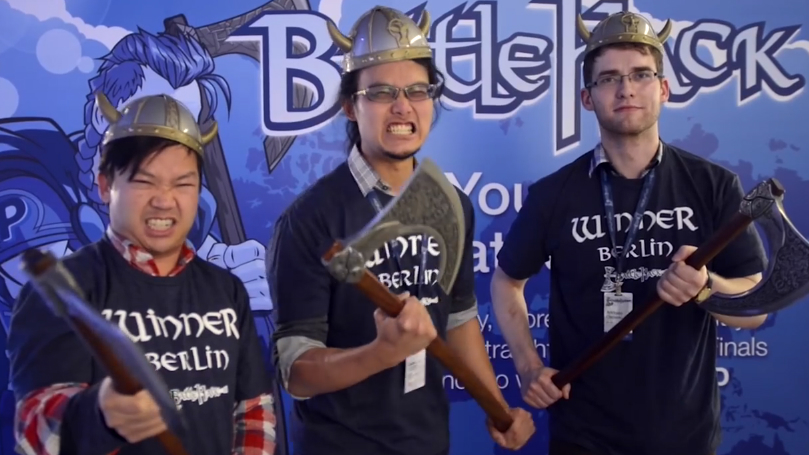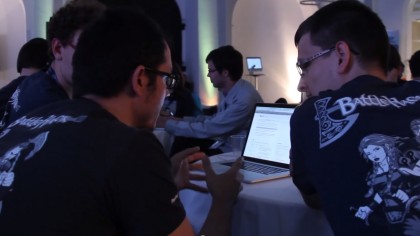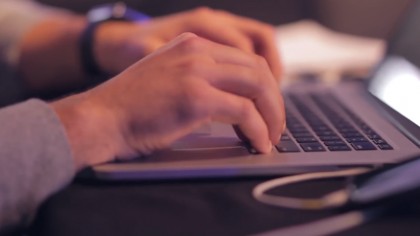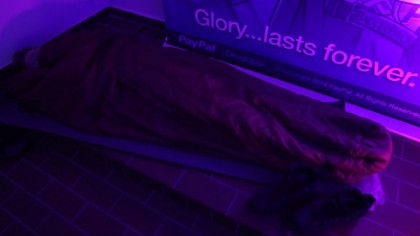The hackathon-winning idea that apocalypse-proofs your phone's reception
No bars? No problem, thanks to PayPal's hackathon champions

It began with drinks, canapés and Deadmau5 blaring from high-end speakers. There was a palpable buzz in PayPal's town hall situated about 15 minute's drive outside of central San Jose, California. The room was filled to bursting with enthusiastic programmers, looking forward to the next 24 hours spread out over two days of the PayPal/Braintree Battle Hack Hackathon.
This meant two days of coding. Two days of crunch. Two days of endless coffee, Red Bull, arguments, U-turns, more arguments and above all, eye-reddening concentration. Sounds like hell on earth. For these people, it was sheer heaven.
The contestants at Battle Hack are the best of the best. These are the coders, crunchers and hackers who beat out the scores of their peers to qualify for PayPal/Braintree's hackathon. They're then flown from disparate parts of the world – London, Tel Aviv, Singapore, Miami to name a few – to San Jose to prove their mettle against the cream of the crop. Within a 24 hour timeframe they've got to create an app with social relevance, present it and somehow tie it in to Paypal's online payment system. The winners take home $100,000 a golden plated commemorative axe (have fun getting that through customs). Simple, really.

Except not. All of the participants in the Battle Hack final earned their place with an app they developed over a relatively long time. For the final they had just a few weeks to go one better on their winning work - a stern test by anyone's standards. Still, it was a strong field right from the outset.
Coming up with the killer app
Team San Francisco, for example, pitched an app that turns not using your smartphone into a game. Owners set time constraints for each other via their contact books and score points on a leaderboard by staying off the phone. Losers then donate money to charity when they go over their allotted time.
The four-person team from Toronto created an app for the visually impaired; using the iPhone's Siri function, visually impaired owners can scan items in the grocery store and have their phone tell them what they are and how much they cost.

For its part, Team London created a peer-to-peer education app aimed at students. Premium content can be purchased with PayPal, but the app functions principally as a free tutoring system that can be used globally. It's the sort of initiative that would benefit countless kids in the UK alone, and one the government probably wouldn't come up with in a month of Sundays.
Sign up for breaking news, reviews, opinion, top tech deals, and more.
In the end, Battle Hack 2014 was won by a pair of blokes from Israel, Shai Mishali and Pavel Kaminsky. Their triumphant idea? AirHop, an app that enables smartphone owners to make calls and send texts even if they have no simcard or reception. After they announced it on day one of Battle Hack, journalists in attendance were rather sceptical about their ability to pull it off. When they demoed it working the following day, we were surprised that the phone industry wasn't sending in the flying squad – since all of the presentations were being streamed live on YouTube.
Ready for the zombie apocalypse
"We had the idea for this about two days ago," says Pavel. "We were sitting in a coffee shop near my house and discussing what we were going to do at Battle Hack."
"I mentioned that I had to pick my girlfriend up from the airport and I had no reception. There were plenty of people around me but I was a bit shy to ask one of them whether or not I could use their phone to make a call. At that point, Shai and me started bouncing ideas off each other."

The way AirHop works is rather simple: it essentially lets users 'hop' onto another person's device and use their connection to make a phone call or send a text in exchange for a payment made through PayPal. It also allows them to use the host device's WiFi for a nominal fee. The implications of AirHop are pretty staggering. While in the First World connectivity is easy and abundant, in developing countries this isn't always the case. Pavel says they built the app with this in mind, although they haven't written off the possibility of AirHop causing a stir in the West.
"It doesn't have to be exclusively for the Third World, though," says Shai. "If you think about this year when you've seen riots and panic and the spread of Ebola – in a crisis situation, usually the first thing that breaks down is the lines of communication. AirHop could really help with this."
"Anywhere that's crowded, you'll have a connection problem too – music festivals, conferences – and if you're backpacking you could be without a signal," he adds. "It doesn't just have applications if the zombie apocalypse happens."
Shai and Pavel leave Battle Hack with the hackathon's premier bragging rights – not to mention two golden axes and $100,000 in their PayPal accounts. But they also take a groundbreaking piece of technology back out into the world, which they hope to take further. AirHop was created and demoed in just 24 hours. The mind boggles at the prospect of what these two could create with a bit more time and funding.